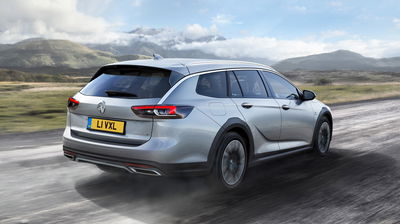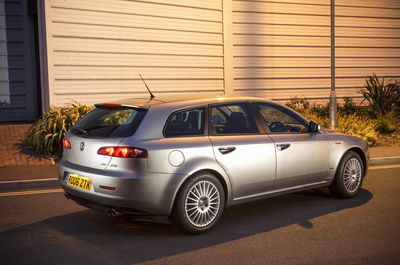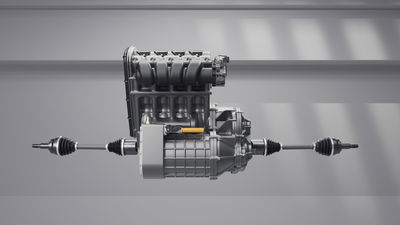Slow SUV Growth And Profit Targets Could Spark A Wagon Revival

There was some fuss earlier this week when campaign group was furious about new stats that showed SUVs were out-selling electric cars by 37 to one. Their argument was that governments should be imposing appropriate tax regimes or general penalties to force people away from SUVs and into tiny BEVs.
This is wanton piffle. People buy SUVs because they’re comparatively big, spacious and high-up compared to saloons and hatchbacks from the same footprint class. You can’t and shouldn’t be able to stop people employing their freedom of choice, such as it is, to the degree being demanded.

You can’t force a family of four (or more) into a Nissan Leaf. For a start they’re still too expensive compared to larger ICE counterparts, and for another they’re just not big enough. Pushchairs are bloody massive, if you hadn’t noticed. They fold, but what good is it when after you’ve collapsed the structure they’re still the length of a fully-grown adult python? You need a big car to put things like that in, or for going on holiday, unless you’re seriously asking people to hire a larger car whenever they need one, as if their main car won’t be expensive enough.
No, the fuss was about nothing. Nothing that we can apply common sense to, anyway. SUVs are the vehicle of choice for the masses right now. Campaign groups may not like the increased use of materials and the inherent decreased efficiency of a larger, heavier vehicle, but perhaps there’s common ground emerging between us and them, and that doesn’t happen very often.

You see, we’re not the SUV’s biggest fan either. We know that lower cars are lighter, more agile and more fun, and this is without exception. A Porsche Panamera is more fun than a Cayenne. A Seat Leon is more engaging than an Ateca. A Clio is better to drive than a Captur. There isn’t a single exception to this rule that we can think of. So we’d be happy to see the back of the high-riders, but if these are the cars people feel happiest with, why should they be denied?
Interestingly, though, sales of large SUVs from mainstream brands have begun slipping. The Skoda Kodiaq, Ford Edge and Hyundai Santa Fe are among those cars whose image used to be premium, owing to their size as much as anything else, but that are now flailing for survival in the same way the mainstream large saloon did. Seen a new Citroen C5 lately? A Renault Laguna? Not in the UK, you didn’t. The C5 is now an Aircross-badged SUV, and the Laguna is just a memory.

Here’s some more food for thought. A Volkswagen Tiguan weighs between 1415kg and 1740kg, depending on the model and the source of your info. Volkswagen no longer puts it in the Tiguan’s brochure. A Mk7 Golf estate, with a similar boot size, weighs from 1285kg to 1584kg, the latter figure including four-wheel drive and Alltrack add-ons. From our research the like-for-like weight differences between SUVs and estates from the same maker are generally in the region of 120-200kg. That’s two or three adult passengers, and enough to matter.
Efficiency is the same story; 10-20 per cent better in favour of the lower cars. Aerodynamics figures are harder to get hold of but it doesn’t take a mathematics doctorate to see that a bigger car with more frontal area will generally be less smooth through the air than something lower and narrower. Progress is being made, but you can’t fight physics.

Our theory is that estate cars are the solution-in-waiting: lighter and easier on energy use from well to wheel, but big enough for families and people whose boot is a second wardrobe. They’re better-looking, easier to get your life in and out of and theoretically cheaper to make. The only thing they don’t offer is the high driving position. The specific importance of that has yet to be measured in any study we’re aware of.
In the near future manufacturers are going to be struggling with profitability, and one area they can cut is material use. SUVs are the enemy there, and canny marketeers may see the opportunity to rebrand and remarket the estate car for the same price as the SUV. There’s a strong case for making it the next big thing as the SUV fad cools. Better to drive and kinder to the planet? That sell will only get easier.














Comments
YES PLEASE
Best automotive news I’ve heard all year!
If you want to save the planet, in reality, you need to make sure the car you are buying is not a SUV. That’s about it.
Does this mean that America might eventually get a focus wagon?
HALLELUJAH!!!
The only good thing about the SUV take over is that it will result in the Estate Car comeback. Looks like that is starting.
“We know that lower cars are lighter, more agile and more fun, and this is without exception. “
That’s an overgeneralization. Just because a car is lower than another doesn’t mean it is always lighter, more fun and more agile. The new Taycan has a low center of gravity but is one of the heaviest Porsche’s ever built.
Thats
Not
The
Point
Pagination